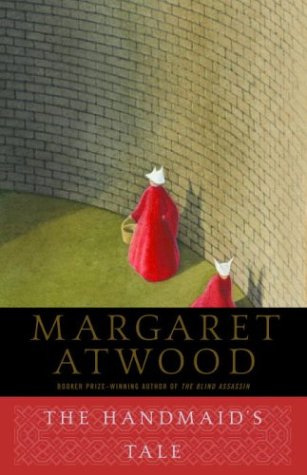For my first Margaret Atwood novel, I
chose The Handmaid's Tale of
course! Having heard about it for around a million years, I finally
snagged a copy and wound up reading through it at top speed cause I
needed to know what was going to happen next.....
That, to me, was one of the things
Atwood did so well: creating a sense of dread mixed with excitement,
fear mixed with defiance, that keeps the reader on the edge of
his/her seat. Will Offred convince herself to submit to the military
patriarchy that forces her to choose between procreation or death? Or
will she capitalize on the tiny hints of insubordination in the
people surrounding her, both those with and without power?
Of course, my mind conjured scenes from
1984 and Brave New
World while I read The
Handmaid's Tale, but Atwood's
novel held out the promise that circumstances weren't irreversible-
yet. Resistance fighters and double-agents might still be able to
undermine the Republic of Gilead before the next generation of girls
know nothing different.
What struck me the most, though, about
this novel is its metafictional aspect. Throughout the first-person
narrative, Offred offers the reader multiple storylines based on a
single event: for instance, she tells three different versions of
what (might have) happened to her husband, Luke, when they were
arrested trying to escape into Canada. Holding all three
possibilities in her head (he is dead, he is alive but in prison, he
is free and safe) enables Offred to believe that both all and none of
these scenarios are true. In this way, she wards off an emotional
breakdown (she does the same when thinking about what happened to her
daughter).
The
"Historical Notes" at the end of the book, though, are
fascinating, removing the reader from the primary narrative, which is
recast as a document to be studied by academics. At once, the "Notes"
are a supposedly objective look back at the past when the Republic of
Gilead was at its pinnacle, but they are also an ironic commentary on
the ways in which we all manipulate the past to suit the narrative we
want to construct. While everything Offred does is ultimately an
attempt to retain her identity and individuality, the "Notes"
strip her of them entirely, reducing her to nothing more than an
example from history.
Now
I'm extra excited to
read Atwood's trilogy...

I enjoyed The Handmaid's Tale too! It was my first Atwood read and it won't be my last :)
ReplyDelete